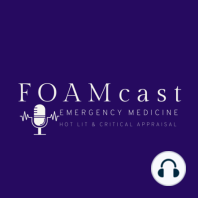19 min listen

anti-NMDA receptor encephalitis and communicating with patients at #smacc
anti-NMDA receptor encephalitis and communicating with patients at #smacc
ratings:
Length:
10 minutes
Released:
Mar 27, 2019
Format:
Podcast episode
Description
We are at #smacc in Australia thanks to the Rosh Review! The opening session this morning was amazing and we can't do it justice on the podcast. Gill Hicks (@MadForPeace), a victim in the July 7, 2005 bombing attack on a London train spoke on how impactful everyone in the healthcare delivery system can be (from medics to detectives to nurses to physical therapists to physicians). Dr. Dara Kass delivered a powerful talk on vulnerability, responsibility, and lack of knowledge even in a super health care literate individual.....what it means to be a provider and a patient (and a mom and a medical home for the family and a wife) in her story of donating part of her liver to her son. David Carr on anti-NMDA receptor encephalitis Anti-NMDA receptor encephalitis is the most common cause of encephalitis in young people (<30 years old), with an average age of ~20. We review the presentation, diagnosis, and treatment of this disease Thanks for listening! Jeremy Faust and Lauren Westafer
Released:
Mar 27, 2019
Format:
Podcast episode
Titles in the series (100)
Episode #1: Cyanide and Carbon Monoxide Toxicity: An Emergency Medicine and Free Open Access Medical Education (FOAM) Core Content Review by FOAMcast - An Emergency Medicine Podcast